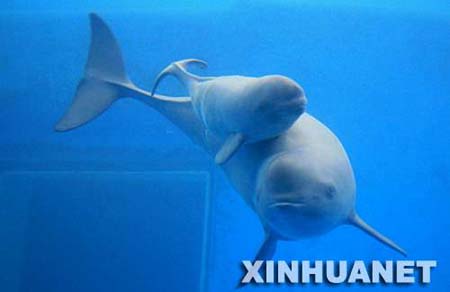| Home / Environment / News | Tools: Save | Print | E-mail | Most Read |
| Baby Finless Porpoise Doing Well at Aquarium |
| Adjust font size: |
The baby finless porpoise born a month ago at the Wuhan-based
Wang Ding, deputy head of the institute, said the first month of its life was a critical period for the young mammal. On June 2, a female finless porpoise gave birth to a male cub at the White-flag Dolphin Hall of the Hydrobiology Institute in It is the third baby that the nine-year-old female finless porpoise has produced since July 2005. Dr. Hao Yujiang said scientific workers had been monitoring the one-month-old baby finless porpoise around the clock over the past month, observing it search for food, breathe and watching it develop its relationship with its mother. "The month-old finless porpoise has been behaving normally in terms of milk feeding, swimming and brushing off external skin, and has a good relationship with the other young finless porpoise born nearly two years ago," said Dr. Hao. "The baby still depends on mother porpoise's milk. In its third month it will start developing the ability to digest small fish," said Hao. "Observation will continue until it is one year old, with every attempt being made to prevent the cub from falling ill." Finless porpoises, like white-flag dolphins (or baiji), are rare mammals endemic to the mainstream of the Yangtze River, International scientists failed to find a single white-flag dolphin during an expedition from November to December last year. Most experts agree the species is "functionally extinct". Experts estimate that only 1,200 to 1,400 finless porpoise currently inhabit the Yangtze mainstream, Busy ship traffic interferes with the sonar dolphins and finless porpoises to find food. Fishing nets and pollution are other factors that have contributed factors to the decline of the species. Faced with a dramatic decline in the number of aquatic species in the Yangtze in recent years, Chinese scientists are trumpeting the birth of the baby finless porpoise as a success. "Our success in breeding the baby finless porpoise in captivity shows that (Xinhua News Agency July 3, 2007) |
| Tools: Save | Print | E-mail | Most Read |
 |
| Related Stories |
|
||
